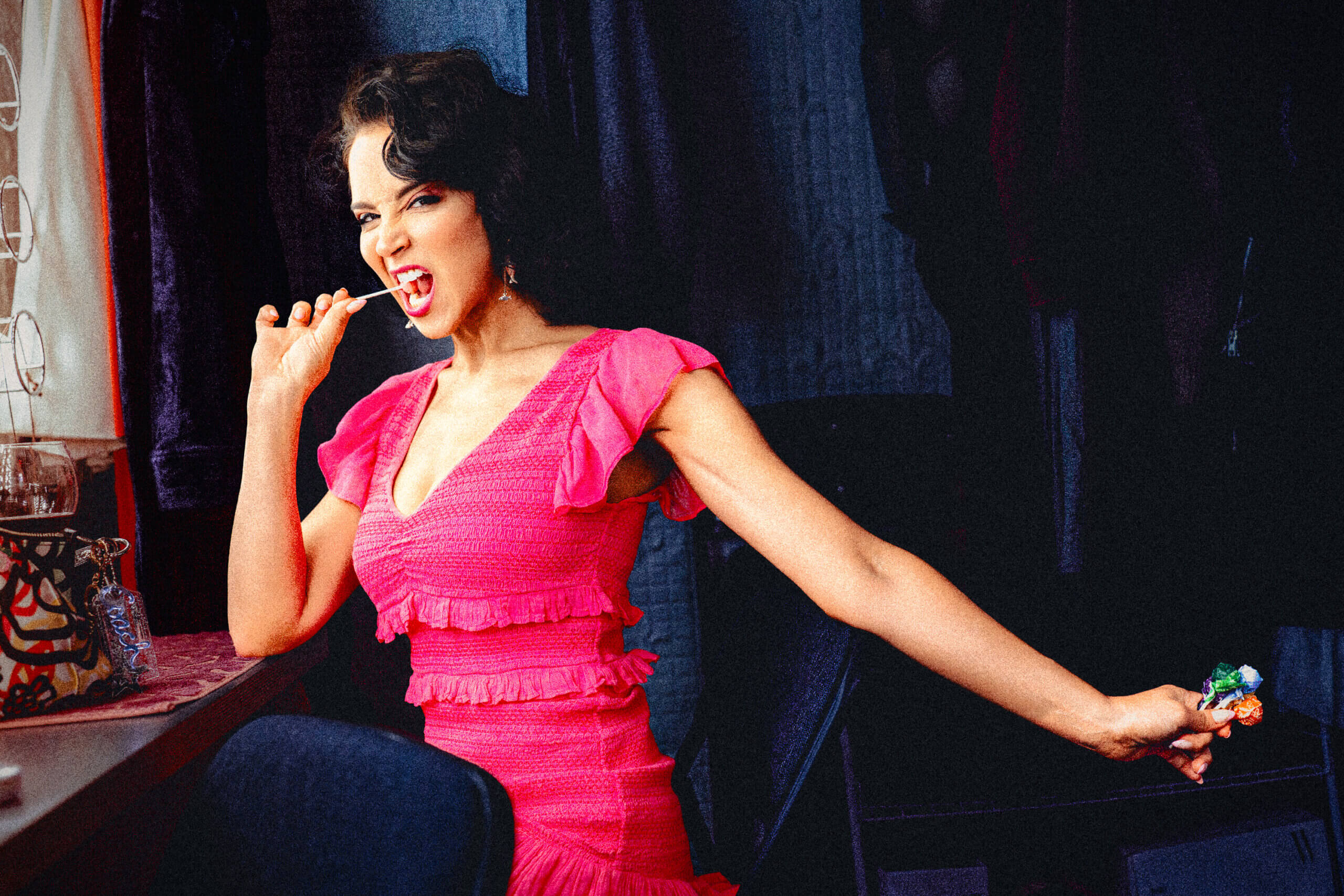In this ‘Merchant of Venice,’ tragedy tomorrow, comedy tonight
Igor Golyak’s production brings the show back to a comedic mode the way Shakespeare intended — to make a point about antisemitism

The cast of The Merchant of Venice, directed and adapted by Igor Golyak. Photo by Kirill Simakov
This Shylock wears Groucho glasses.
Stalking the stage in a rehearsal for director Igor Golyak’s Merchant of Venice, Richard Topol plays it to the hilt. He tabulates his interest rate on the back of an unwilling gentile. He rubs his fingers over imaginary ducats and beats his chest in Yom Kippur tempo as he declares “sufferance is the badge of all our race.”
Topol’s embodying the part Shakespeare wrote: the Jewish usurer who demands his literal pound of flesh.
But when the titular merchant, Antonio, played by T.R. Knight, and his friends are out of earshot, Topol’s kvetchy, monstrous moneylender whips off his novelty glasses and, in a sober aside to the audience, confides how these good Christians “spet upon my Jewish gabardine.”
His intention in breaking character, Topol says, is to remind the crowd “that the character I’m playing gets treated like shit for no reason.”
Funny stuff. Or, at least it was meant to be when it premiered in 1598.
When the play was published in Shakespeare’s first quarto, The Merchant of Venice (With the Extreme Cruelty of Shylock the Jew) was classed as a comedy. but since then it has become the ultimate problem play. Modern productions, in the period after the Holocaust, strive to transform Shylock into a tragic figure to make a point about tolerance that the text itself resists.
Igor Golyak had another idea.
“It was a comedy for its time,” said Golyak, who will debut his Merchant Nov. 22nd at New York’s Classic Stage Company after his acclaimed second run of Our Class, a Holocaust drama, featuring most of the same cast. “It was a comedy where good defeats evil.” (The evil — the villain — was of course the Jew.)
To that end, Golyak, following a 2021 production in Boston, is setting his play in a kind of fusion of a late night talk show and Saturday Night Live, aiming to evoke the original mood of popular entertainment of the 17th Century through forms that a modern audience can recognize. The goal is to play it in the key of comedy, with a live band and scenes staged like sketches. In this setup, Shylock is a source of stale ethnic humor, which, as the show goes on, will stop being so funny.

“I’m trying to really lean into and see if we as an audience changed,” said Golyak, who is Jewish and immigrated to the U.S. from Ukraine when he was 11. “Is it just the quality of our perception that’s changed, or did we change?”
“One of the main points for me is that evil lives in good people,” added Golyak, who wants Shylock’s oppressors to be a likable comedy troupe, and so implicate the audience for laughing along.
Topol, who in Our Class plays the character Abram, the only member of a Polish class to leave Europe before the Holocaust, has to make a hard pivot when he comes into rehearsals for Merchant. In Our Class, his character has “peopled the world” with progeny and become a rabbi. In Merchant he goes to a bleaker place that he likens to Peter Finch’s Howard Beale in Network (and, not to spoil much, Arthur Fleck in Joker).
“I’m entering a journey that is so much darker for me,” said Topol, who understudied Al Pacino’s Shylock in a 2010 Broadway production, “on-the-edge, crazy, vengeful, carrying the weight of the entire history of antisemitism.”
“This production is asking of me to face my own relationship to my Jewishness in the world that we live in now, which is conflicted, to be clear,” said Topol, noting that he connects to the character most now as a father. (Shylock’s daughter, Jessica, is stolen from him, a final insult that Topol believes spurs his character’s cartoonish revenge.)
Playing opposite Topol is Alexandra Silber, whose mother is Catholic and whose late father was Jewish. In Our Class, Silber plays a character forced to convert to escape the Shoah. In Merchant, she plays Portia, the avatar of Christian mercy (not strained), who forces Shylock to convert.
“It’s interesting to be an actual physical actor that does feel like I have feet in both camps and cultures,” said Silber.
Silber, who played Tzeitel in the 2015 Broadway revival of Fiddler on the Roof (and wrote a novel about what happens to the characters after the curtain closes) says her Jewish grandparents rejected her mother. She’s proudly Jewish, but has not always been accepted by the community. She’s bringing that friction to the role.

Amid the comedy, which sees her Portia frantically grooming for her suitors, Silber is playing what she calls “the ugly,” challenging the assumption, already muddied by the Bard, that Jews are vengeful and Christians are uniquely forgiving.
At the same time, Silber believes Portia is similar to Shylock. As a woman, she is disenfranchised, held captive to her father’s will and its bizarre stipulation that the man who marries her must pick one of three coffins, Monty Hall-style.
“There’s very little agency that she has around her own life,” said Silber. “And interestingly, one of the major agencies she takes is against the other oppressed person.”
Golyak’s Merchant arrives at a time where hate crimes against Jews are surging and many are reckoning with their identity and values in the wake of Israel’s war with Hamas.
It won’t be the first time one of Golyak’s shows has been tragically topical. In 2022, his play Witness about immigration and antisemitism, projected a live feed of the hostage situation in a Colleyville, Texas, synagogue during a performance. Our Class’ first run at BAM went into rehearsal shortly after the Oct. 7 attacks in Israel.
But Golyak’s goal is not to be a “message director” providing pat answers to complex dilemmas. In his Merchant, that means have us laughing first and ask questions later.
It’s up to the audience to decide if Shylock, playing up the stereotypes assigned him by gentiles, really is the villain or if — as he says in his most famous speech — he was taught villainy by Christians, and is merely bettering the instruction.
William Shakespeare’s The Merchant of Venice begins performances Nov. 22nd at Classic Stage Company in Manhattan and runs through Dec. 22. Tickets and more information can be found here.
















